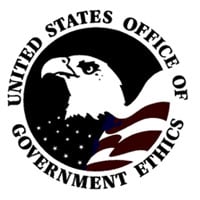 The United States Office of Government Ethics (OGE) is an executive branch agency responsible for establishing policies to reduce, and hopefully eliminate, conflicts of interest between the federal government and its employees. The OGE establishes regulations, standards of conduct, and training programs on the many forms of criminal ethics violations. As you might imagine, the potential for conflicts of interest is high in government contracting.
The United States Office of Government Ethics (OGE) is an executive branch agency responsible for establishing policies to reduce, and hopefully eliminate, conflicts of interest between the federal government and its employees. The OGE establishes regulations, standards of conduct, and training programs on the many forms of criminal ethics violations. As you might imagine, the potential for conflicts of interest is high in government contracting.
Government contracting officers are in essence citizens charged with the duty of spending the nation’s resources in the ways most appropriate to accomplishing the goals of our democracy. Therefore, ensuring the ethical conduct of these individuals is one of the most important responsibilities of the OGE. As a government contractor, it is important to have at least a basic understanding of the ethical restrictions placed upon your contract officer to avoid getting yourself, your firm, and your business partners involved in any legal disputes. There are three broad classes of restrictions to be aware of: Gifts, Impartiality, and Employment.
Gifts
The most obvious, and in some ways complex, of these restrictions is the regulation of gifts. While most are likely aware that government officials of any type are not free to receive gifts as a private citizen might be, fewer can keep track of the numerous rules which apply specifically to contracting and procurement officers. Even the gifts they make among themselves to celebrate a coworker’s wedding or retirement are subject to a degree of regulation. Therefore, the best policy regarding gifts and your firm’s contracting officers is one of avoidance.
In some limited cases, government contracting representatives you interact with might be legally permitted to accept something from you of very small value, but it’s best to forego the situation all together. Contracting officers are instructed on the implications of gift restrictions through formal training, and as a result they know not to expect them. So, while picking up the tab on meals or providing entertainment might be a natural component of your business relationship with other clients, it’s neither expected nor, in most cases, legal when dealing with government business people.
Impartiality
The OGE also regulates against the risk that a contracting officer’s financial security or personal relationships could create a conflict of interest. The OGE addresses these concerns by limiting the contractors they are permitted to deal with. Understandably, contractors are not permitted to work on a Government matter that has an effect on the financial interests of any organization in which they serve as an employee, officer, director, trustee or partner. The same is true of any contracting firm in which an individual who has a “covered relationship” holds any of the same positions. The OGE defines a covered relationship as one of a close personal nature and includes the contract officer’s spouse, children, business partners, parents, and any non-political party organizations in which these individuals actively participate.
So remember, there is no “friends and family discount” in federal contracting. While this rule is integral in ensuring fair competition, it should not affect the majority of government contractors. If, however, one of your family members or business partners is a contracting officer, be sure to always work with one of their colleagues to avoid any criminal ethics violations.
Employment
The OGE’s Revolving Door and Reverse Revolving Door policies limit the actions of contracting officers beginning or ending their employment with the government. The Revolving Door policy states that officers leaving, or planning to leave, their position with the Government cannot participate in matters involving their future employer or potential future employers. The Reverse Revolving Door policy, as the name indicates, prevents an individual leaving the private sector to become a contract officer to give unfair preference to his or her former employer.
This rule could be an important consideration for a firm engaged in government contracting. Some degree of crossover from the governmental to private side of government contracting, and visa versa, is common and can create ethical dilemmas.
The most important thing to remember about the ethics of government contracting is to simply use reason. If the average individual with knowledge of the circumstances might doubt the officer’s impartiality, or might suspect a conflict of interest, you are better off requesting to work with a different contracting officer. Ultimately it could save both you and the officer the headache of an OGE ethics investigation, or worse.




